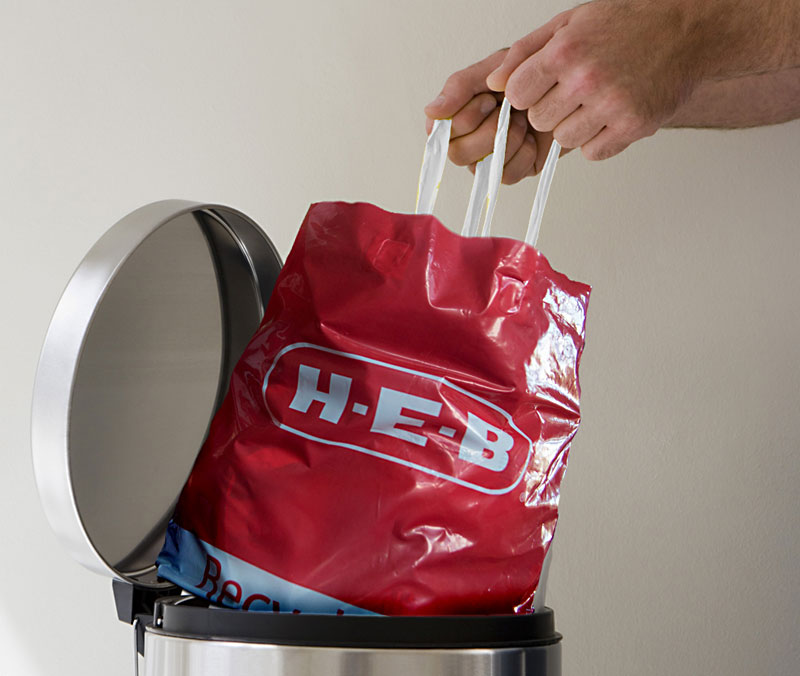Bag Ban Aftereffects
City report shows many reusable bags are used just once
By Jessi Cape, Fri., Aug. 28, 2015
In June, Austin Resource Recovery and the Zero Waste Advisory Commission presented to City Council a report on the environmental impacts of the bag ban two years after it went into effect. While litter has certainly been reduced, a new (big) problem's popped up: Reusable bags are not being reused. Increasing public awareness is now the top priority going forward, but changes to the ordinance are likely in the works as well.
"Because of the Single Use Bag Ordinance, Austinites have removed 50,000 pounds of plastic from our annual waste stream, reduced local bag use by 200,000,000 per year and achieved a 75 percent reduction in bag waste. We have a lot to be proud of," says Rick Cofer, former chair of the Zero Waste Advisory Commission (his term ended in July) and chair of the Ban the Bags Coalition. The single-use bag ordinance, passed in March 2013, aimed to "change the behavior of its citizens in an effort to improve the environment and decrease waste," according to the report, which compiled data from two comparative studies. There was a litter-composition study comparing a municipality without a bag ordinance – Fort Worth – and one from Austin since the ordinance took effect; and also a single-use bag audit at both of Austin's single-stream residential recyclable material vendors, and at a combination of municipalities without such an ordinance. No doubt about it: The study provides empirical data that litter was certainly reduced, but some of the identified negative results have many pondering what to do next.
The primary problem, the report revealed, is that a large number of reusable bags in the recycling streams were found to be grossly underused. That is, many of the 4 mil. (4/1,000 of an inch) plastic bags are being tossed out after a single use – an act that defies the bags' usefulness by failing to offset their carbon footprint. These heavier plastic bags are often made overseas from nonrecycled low-density polyethylene, which means they require more resources to both manufacture and break down than the single-use bags. Bob Gedert, director of Austin Resource Recovery, explains, "What we found was in the trash streams and recycling streams people were disposing of the reusable bags too soon. They weren't getting reused to the extent that we desired. Part of our reaction to the study is that we need to teach people to get the value in the reusable bags that can be used over and over again."
"Plastic bags are convenient, no doubt about it. But it's certainly easier to bring a reusable bag to the store than to extract oil from the ground, ship it to a refinery, turn it into a plastic bag, and truck it to a store," says Cofer. "I would suggest that we are making a tremendous environmental sacrifice for the slight convenience of the plastic bag."
How did we arrive at these bag options? Before the ordinance, retailers (14,000 businesses are affected) chose what bag, if any, to offer customers. Now, if a bag is to be distributed, it needs to be reusable (cloth, plastic, or paper-based) with handles. The reusable plastic bags (the red-and-white plastic bags from H-E-B, for example), must be used an estimated minimum of four to 12 times before they begin to offset the carbon footprint, but are designed for around 100 uses. Gedert says his observations suggest that cloth bags serve their purpose for more than 200 uses, and can even be thrown into existing loads of laundry for cleaning. He adds, "I'm discouraged by the [paper and thinner plastic] bags that are distributed that barely meet the ordinance and don't meet our reusability standards. They rip and tear too easily." Paper bags, even with the required 80% post-consumer material, require three to nine uses to offset environmental impact. Cofer agrees, "Paper bags need to be removed entirely and the standards for plastic-based reusable bags must be heightened." Cloth is generally considered the best environmental choice, and the most long-term cost-effective, but for now, the reusable plastic bags will stick around because of the affordability factor. Neither had a clear answer when asked about possible programs that could be implemented to offset costs for cloth bags.
Cofer and Gedert both said that changes to the ordinance are needed. But while Cofer believes that "now is the time," Gedert does not plan to go to City Council just yet: "The report highlights some weaknesses that we want to focus on, and public awareness is my first reaction. Changing the ordinance would be a consideration about two years down the road." To get the information needed to strengthen compliance, make better bag options available, and promote reuse, Resource Recovery formulates a variety of reports. Resident feedback is paramount.
Resource Recovery's Insights campaign – an online feedback loop from Austin residents, with more than 1,200 users – closed Monday, Aug. 24, with 15 major observations identified so far (and counting). Gedert explains, "Forty-four percent of what we're sending to the landfill are recyclables. So the basic question is: 'How do we stop the flow of recyclables to the landfill and put it in our blue carts?'" Gedert and his department will create an action list in the next few months based on the citizens' suggestions, and use that to implement new public awareness campaign strategies. On October 17, a consolidated Recycling & Reuse Drop-Off Center launches at their Todd Lane facility to help promote and facilitate reuse habits – the key to positive environmental impact. At the one-stop facility, residents can drop off household hazardous waste materials, electronics, brush, single-stream recycling items, and more.
"In our hierarchy of zero waste, reuse has primacy over recycling," Gedert says. "Recycling is the end-of-life management of an item. Reuse is the middle life of a product or package option. It still has life left to go by reusing and reusing it. We get that with food storage containers – Tupperware, Rubbermaid, things like that. We get that message. I'd like to see how our residents reflect upon reuse in other formats than in the kitchen. That would be with the reusable carrying bags as well as promoting reuse for discarded furniture and larger items. My observation is a lot of that material can be reused by somebody else.
"I know we're talking about bags and reusing bags, but the larger conversation is, 'Can we reintroduce the concept of reuse prior to talking about recycling?' Our grandparents were very actively reusing items to be thrifty and smart in material reuse and we lost that concept somewhere. We've got to reintroduce that back into our culture."
The city's Resource Recovery Center is at 3810 Todd Ln. More info at www.austintexas.gov/department/austin-resource-recovery.
Got something to say on the subject? Send a letter to the editor.









